Material Options for Raised Beds
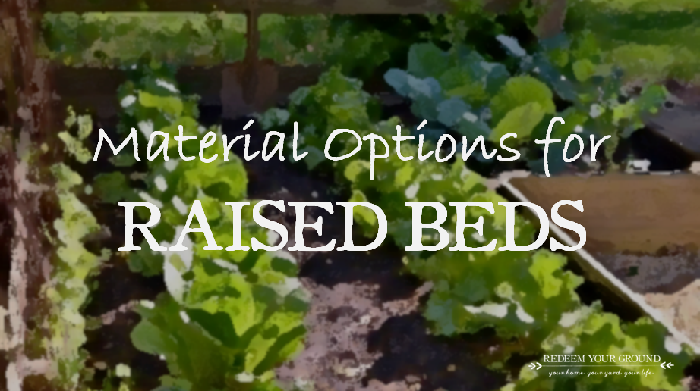 One of the most common questions I hear from first-time veggie gardeners who have their minds set on growing their veggies in raised beds is…What material should I use to build them?
One of the most common questions I hear from first-time veggie gardeners who have their minds set on growing their veggies in raised beds is…What material should I use to build them?
This is largely borne out of a concern for the chemicals used to treat pressure treated (PT) wood…since that’s what’s often used for building things outside. Essentially people don’t want to eat something that has come into contact with anything that’s bad for them. I get that…and this fear is grounded in history.
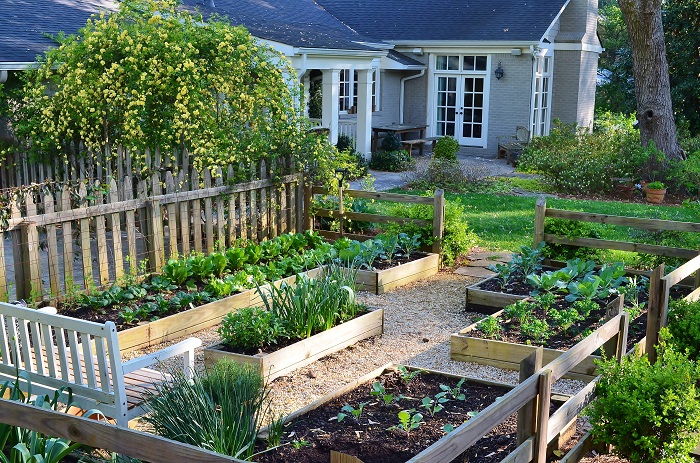 You see, although PT wood has been used to build raised bed for a very long time, prior to 2004 arsenic was one of the primary chemicals used to treat PT wood…and we know that arsenic isn’t the best thing to consume. However since then the EPA banned the production of wood treated with arsenic for residential use. But there still may be reason for concern.
You see, although PT wood has been used to build raised bed for a very long time, prior to 2004 arsenic was one of the primary chemicals used to treat PT wood…and we know that arsenic isn’t the best thing to consume. However since then the EPA banned the production of wood treated with arsenic for residential use. But there still may be reason for concern.
Keep reading and you’ll find out why…in addition to other options you could consider. ![]()
Pressure Treated Wood
Again, as I stated above, today’s PT wood is not yesterday’s PT wood. However, depending on who you talk to, you still may not want to use it…as trace amounts of the new chemicals used to treat PT wood (I’m not going to get too technical on you…but namely copper) could still leach into the soil and be absorbed by your veggies. And some people aren’t comfortable with that.
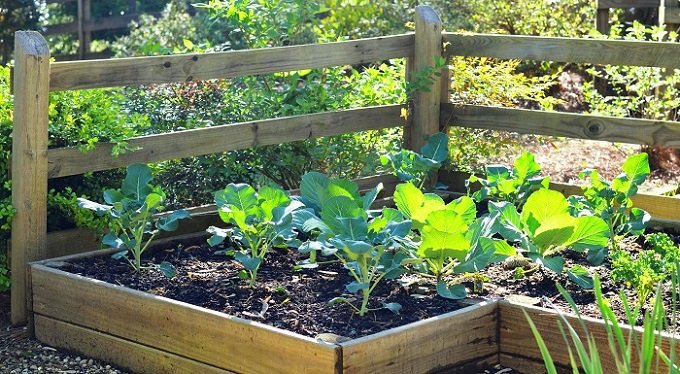
Even more…if you want a veggie garden that can officially be considered “organic”, today’s PT wood still doesn’t pass muster. Now you could go to the trouble of lining your raised beds to mitigate the remaining potential hazards, but if you’re an organic truest you’ll need to consider other options.
That said, PT wood still has its advantages. It’s less expensive, more readily available, and very durable…lasts longer.
Other Woods
Red cedar, redwood, and cypress are all naturally rot-resistant. So they are also very good choices to use for your raised beds. However, they are often more difficult to find than PT wood, but if you let your fingers do the walking…or Googling…you should be able to find what you’re looking for.
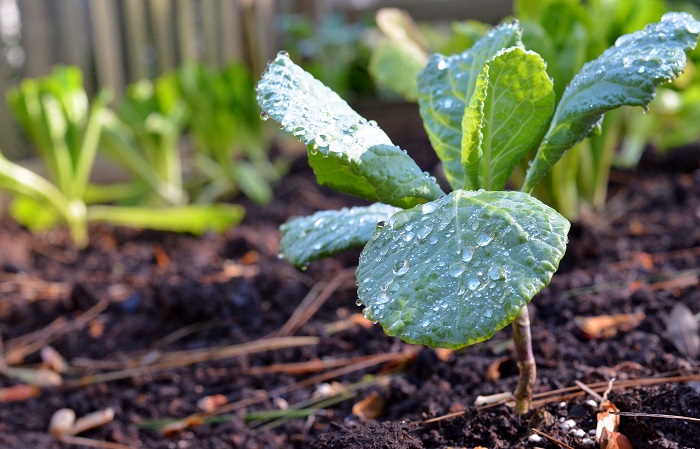 You should also be aware that these woods are more expensive from both a short-term and long-term perspective…they cost more to buy and they don’t last as long…so you’ll likely have to replace them sooner than you would PT wood.
You should also be aware that these woods are more expensive from both a short-term and long-term perspective…they cost more to buy and they don’t last as long…so you’ll likely have to replace them sooner than you would PT wood.
Alternatives to Wood
Wood is not the only game in town…there are a number of other options you could consider to use when building raised beds. For example: stone, cinder block, brick, rocks, metal, plastic lumber, and even straw bales.
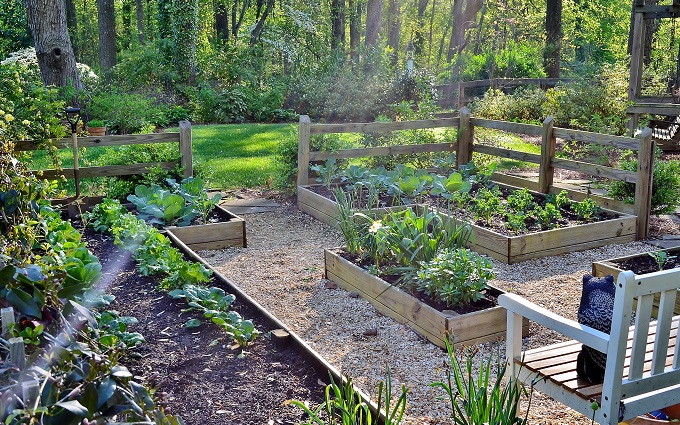 Some of these options are more costly than others…and may still require…or at least you should consider…lining them to minimize potential toxicity and treating them to make them more durable. But the point is…you have options and you should consider them.
Some of these options are more costly than others…and may still require…or at least you should consider…lining them to minimize potential toxicity and treating them to make them more durable. But the point is…you have options and you should consider them.
Check out the link below from Houzz for a much more extensive list of potential materials you could use for your raised beds…with pros and cons for each.
Resources | Helpful Links
Here are a few other posts you might find helpful in your quest to build the perfect raised bed vegetable garden:
- Fine Gardening: http://www.finegardening.com/are-pressure-treated-woods-safe-garden-beds
- EcologyCenter.org: http://ecologycenter.org/blog/building-raised-beds-for-planting/
- Horticulture Magazine: http://www.hortmag.com/video/choosing-and-constructing-raised-gardening-beds
- Houzz: http://www.houzz.com/ideabooks/16676705/list/8-materials-for-raised-garden-beds
![]()
So what did we use? I know that my organic friends may gasp at hearing this, but we used PT wood…the new kind. Truth be told, our choice came down to PT wood being cheaper and easier to find…and we sided with the camp that suggests that today’s PT wood poses little to no risk. That said, if we were building them today…being a bit more health-conscious now, we would probably go with red cedar.
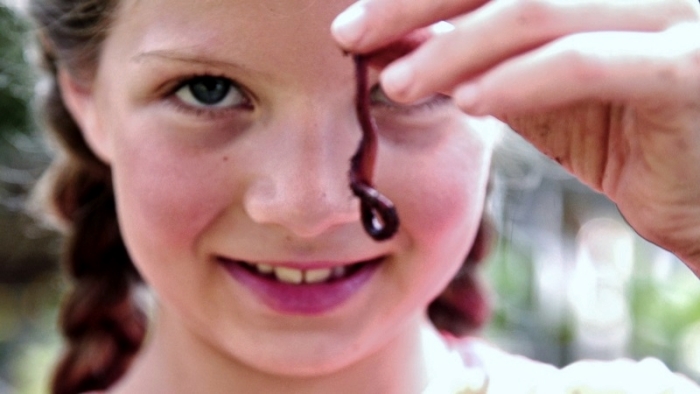
But at the end of the day, it’s a personal choice. Consider your options, do a bit of research, see what you can afford…and then get to work and build them! In other words, don’t let analysis paralysis keep you from not only enjoying your very own bountiful harvest, but from all the memories and learning that will take place along the way!
Take care & happy gardening y’all,
![]()
You may also enjoy these posts from RYG ...
If you're not already subscribed to RYG and want to get periodic updates, links to new posts & other ground redeeming info ... just enter your email address below. Easy as that!

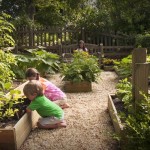

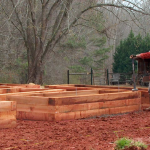


I saw your article in Sothern living .
Your home is beautiful Just wanted to check out your site. Thanks I will be trying a few things. I am 64 now and my husband travels so I would be doing all the work so will just do a few things. Love the chicken coop but have a 9 month lab male puppy. Looks so much fun. Thanks Deborah
Hey Deborah…thanks so much for reaching out and for your kind words about our home! I hope you do find some things on our blog that are helpful. It is a lot of fun spending time outside connecting with friends and family while getting your fingers dirty! Take care and thanks again, D.
I also found your site after reading the article in Southern Living. We’ve been in our home for almost 4 years and our back yard is still just grass. I love how you’ve defined different areas and would love to do some of the same things. However, I suffer from analysis paralysis and never get started because I don’t know how the finished product should look. Love the site and ideas and love to see other families also feel the urge to slow this crazy life back down and spend time enjoying one another. Look forward to exploring your site more!
Jessica…thanks so much for reaching out and so glad you found us in Southern Living. That was pretty strange seeing our yard in its glossy pages! Humbled and honored for sure.
And thanks too for your kind words about our blog…and our pursuit to redeem our own ground…and hopefully help/encourage others to do the same with theirs.
Yea…analysis paralysis is a common ailment among homeowners…particularly those who do have a sense of style…and tend to lean a bit “perfectionistic”. I’ve found that although those types of folks can make things happen really well inside their home, but get freaked out once they step outside their door. So as you referenced, do think of your yard in terms of “rooms” and then tackle one room at a time, like you would decorating your home. But as my dad has always said, the worst decision is decision-by-indecision. So just jump…I’m sure you’ll be glad you did…everything will look great…or at least better than it does now!
Take care and let us know if we can help you in any way. Cheers, D.